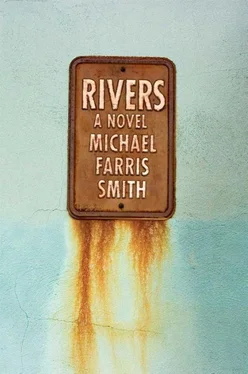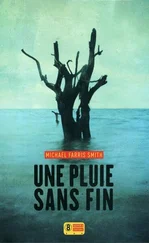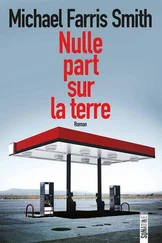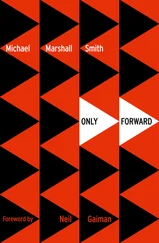It wasn’t going to be a big room. She won’t need a big one for a while, Elisa said. Then you can build us a big house with rooms like concert halls. With whose money, he had wanted to know. She shrugged and said we’ll worry about that then. So it was going to be an average room, built onto an average house, protected by the same blond brick as the rest of the low-ceilinged ranch-style house. An average room for what they expected to be a much more than average little girl. Her place to sleep, and play, and grow. Four years ago the foundation had been poured, before it was impossible to pour a foundation, before it was impossible to imagine such things as building a room onto your house.
Now all it did was rain. Before the storm. During the storm. After the storm. Difficult to tell when one hurricane ended and the next one began.
He sipped the coffee and then lit a cigarette.
Goshdamn wood will never dry out, he thought. And he had thought and thought of ways to frame a room with wet wood, onto a wet slab, that would stand against hurricane-force winds, but he hadn’t made it there yet. Unless God changed His laws, he wasn’t going to ever get there. He scratched at his beard. Drank the last of the coffee. Watched out the window and smoked the cigarette. Then he decided to go and see if Charlie was around.
He climbed on a chair in the kitchen and moved away a water-stained ceiling tile, reached his hand up into the hole, and took down a cigar box. He opened the box and there was a stack of cash and he took out four hundred-dollar bills and he folded and stuck them in the front pocket of his jeans. After he put the box away and set the ceiling tile back in place, he picked up the radio from the kitchen counter, turned it on, and listened with his ear close to the speaker, the distant voice of a man overrun by clouds of static. He turned it off, and then he walked over to the cot and picked up the raincoat and sock hat and put them on and then he walked over to the closet. He chose the sawed-off shotgun over the .22, kicked at the empty box of shotgun shells, and then made sure the one and only shell was still in the chamber. The dog crossed the room and stood at his side and followed him to the door but stopped there.
“I’ll leave the door open for you,” Cohen said and the dog looked up at him, out at the rain, then went back inside.
He went out to the Jeep and sat down behind the wheel and set the shotgun on the passenger seat. He had drilled holes in the floorboard to keep the water from puddling, and an overflowing rain gauge was tied to the roll bar. The Jeep cranked and then he drove across the front yard toward the muddy gravel road, leaving tire tracks in the earth.
At the end of the road, he turned onto the two-lane highway that connected him to the busted interstate running parallel to the water. The sky was a lighter gray to the west, but far off in the southeast was a gathering of pillow-like clouds. He turned onto the highway and drove along with cold rain against him. At a lower stretch of road, he slowed because of the water and drove on with his eyes far ahead to where the road showed itself again and he aimed for the higher ground, hoping he would remain on the asphalt that he couldn’t see beneath the muddy water. He made it through the water and then after several miles he came to a crossroads with an old gas station where he used to buy boiled peanuts from an old man who sat on the tailgate of his truck in the parking lot. Past the crossroads he came to a small community and he slowed and looked at the remaining houses and stores lining the highway, wondered if there were people somewhere back in there, back in the faceless gray buildings that seemed to be disappearing, as if they were slowly flaking away and sinking into the earth. Even so, he felt like somebody was watching him. Always felt like somebody was watching him when he made his way through one of these ghost towns.
There was a beautiful sadness to it all that he couldn’t explain. It was a sentiment he had tried to ignore, but it had seeped into him and remained, some kind of grave nostalgia for the catastrophes and the way of life that once had been. As a boy he had ridden with his father, and his father would point out the buildings and houses he had framed. Seemed like he had worked on the entire coastline. Gulfport, Biloxi, Ocean Springs, Moss Point. Didn’t matter where they were, what road they were on, his father was always pointing and saying put that one up. Put that one up. Worked on that one there. Put that one up. And Cohen sensed the pride in his father’s voice. Felt his own pride in his old man and his rough hands and what he did with them. His father seemed magical. During the day erecting houses and buildings along the coast and in the evenings feeding cows and bush-hogging the place and in the night sitting in his chair and sipping a drink and walking outside to smoke and talking to Cohen like he was a little man and not a little boy and Cohen wanting to be like him. He had always believed that one day he would ride around with his own children and then grandchildren and he would point out of the window and say put that one up. Did that one over there. Put that one up. And he had been like his father. He had put some of them up. But there were no children to show them to, and even if there were, what he had put up was now down and all he could say was that’s where one used to be. Put one up over there that’s gone. Used to be one right over there. Whenever he went out in the Jeep, he looked around at the concrete foundations, at the splintered remains, at the heaps of debris, at the places where his work once stood, and there was sadness, and despair, and awe. And he wondered what his father would say if he had lived to see his work stripped bare. He wondered how his father would feel now to have his work gone. Simply not there. Removed by the wind and the rain. Removed with violence. Removed without prejudice.
As if it had never been.
IT HAD BEEN 613 DAYS since the declaration of the line, a geographical boundary drawn ninety miles north of the coastline from the Texas-Louisiana border across the Mississippi coast to Alabama. A geographical boundary that said, We give up. The storms can have it. No more rebuilding and no more reconstruction. The declaration came after several years of catastrophic hurricanes and a climate shift suggested that there was an infinite trail of storms to come and the Line said we give up. During those 613 days, there had been no letup in the consistency and ferocity of the storms. Recent months had seen a turn for the worse, something few thought possible.
Those that decided to stay had decided to stay at their own risk. There was no law. No service. No offering. No protection. Residents had been given a month’s notice that the Line was coming and a mandatory evacuation order had been decreed and help was offered until the deadline and then you were on your own if you stayed behind. The Line had been drawn and everything below was considered primitive until the hurricanes stopped and no one knew if that day was ever coming.
Left to itself, the region below the Line had become like some untamed natural world of an undiscovered land. The animals roamed without fear. Armies of red and gray squirrels and choruses of birds. Deer grazing in the interstate medians and packs of raccoons and possums living in garages until they were blown away, then moving on to another dwelling that was now welcome to them. Honeysuckle vines bunched together and azaleas bloomed like pink jungles with the warmer temperatures of the spring. The lemony scent of the sprawling magnolias wafted in the air like perfume.
The kudzu had begun to creep like some green, smothering carpet, taking over roads and bridges. Finding its way up and around chimneys and covering rail lines. Swallowing barns and houses. Sneaking across parking lots and wrapping itself around the trunks of trees and covering road signs. The constant flooding and drying out and temperature swings had split the asphalt of parking lots and roadways, the separations becoming the refuge of rats and skinny dogs. Chunks of beach had disappeared as if scooped out by a giant spoon, leaving the flat waters of a lagoon where people used to sit with their feet in the sand and drink beer from cold glasses and eat shrimp from a bed of ice served in a silver bowl.
Читать дальше











